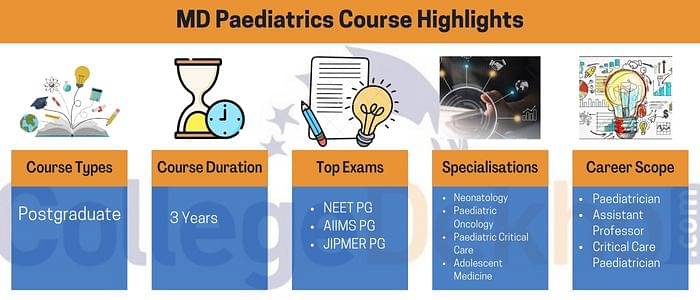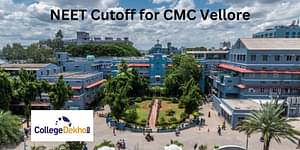MD Paediatrics
MD Paediatrics Course Overview
MD Paediatrics is the short form for Doctor of Medicine in Paediatrics. It is a three-year medical course pursued by MBBS graduates who wish to build a career as a paediatrician. MD Paediatrics course focuses on medical issues and illnesses affecting children from infancy to young adolescence. Across India, multiple universities and medical colleges offer aspirants the opportunity to pursue the MD Paediatrics course in India. Aspirants are required to present an NMC-recognised MBBS degree and clear the necessary examinations to pursue this course.
Currently, to pursue an MD degree, candidates must attempt and rank in the NEET-PG examinations. However, NMC has been working on replacing the NEET-PG exams with the National Exit Test (NExT). Some of the top colleges for MD in Paediatrics courses in India include AIIMS, PGIMER, Kasturba Medical College, Aligarh Muslim University, Christian Medical College and many more. The average tuition fee ranges from INR 5,000 to INR 40,00,000 per year depending on the type of college and fee waivers. After completing this course, candidates can take work as Paediatricians, Neonatology Paediatricians, Critical Care Paediatricians, etc. and earn up to INR 30,00,000 annually as per job title.
Table of Contents
- MD Paediatrics Course Overview
- MD Paediatrics Course Highlights
- Why MD Paediatrics?
- Popular Specialisations
- MD Paediatrics Entrance Exams
- MD Paediatric Eligibility
- How to Get Admission for MD Paediatrics?
- Top MD Paediatrics Colleges
- Top MD Paediatrics College (State Wise)
- MD Paediatrics Fee
- MD Paediatrics Syllabus
- MD Paediatrics Scope in India - Career Options and Job Prospects
- MD Paediatricians Top Employers in India
- MD Paediatricians Salaries in India
- Required Skill Sets for MD Paediatrics
- FAQs about MD Paediatrics
MD Paediatrics Course Highlights

Here are some of the highlights of MD Paediatrics courses in India:
| Name of the Course | MD Paediatrics |
|---|---|
| Level | Postgraduate |
| Duration | 3 Years |
| Exam Type | Semester |
| Minimum Qualification Requirement | MBBS + NEET-PG or equivalent |
| Average Initial Salary | INR 2-8 Lakhs Per Annum |
| Selection Process | Entrance Exams and Interviews |
| Popular Entrance Exams for MD Paediatrics | NEET-PG, AIIMS-PG, JIPMER-PG |
| Top MD Paediatrics Specialisations in India | Neonatology Paediatric Oncology Paediatric Critical Care Adolescent Medicine |
| Minimum Aggregate Required for MD Paediatrics Admissions | 50-60% |
| Major MD Paediatrics Recruiters | Fortis, Indian Council of Medical Research, Max Healthcare, Apollo Hospital, Educational Institutions, etc. |
| Top MD Paediatrics Colleges in India | All India Institute of Medical Sciences (AIIMS) Christian Medical College (CMC) Jawaharlal Institute of Medical Education and Research (JIPMER) Post Graduate Institute of Medical Education and Research (PGIMER) St John’s Medical College |
Why MD Paediatrics?
Apart from being passionate about pursuing a career in the medical field, MD Paediatrics graduates can help children lead normal lives. Here are some other reasons why one should pursue this course:
Career Satisfaction: With the ability to work with children and resolve medical issues to help them lead a normal childhood often leads to high career satisfaction. Coupled with high salaries, as defined below, studying MD Paediatrics can help one achieve high career satisfaction.
Lucrative Salaries: Graduates often find high-paying job roles due to the high demand for qualified professionals. On average, experienced paediatricians can earn anywhere between INR 1-2 lakhs per month. However, the years of experience and expertise that such physicians bring to the table heavily influence their annual income.
Relatively Cheaper: The course fees for the MD Paediatrics course in India can range from INR 5,000-30,00,000 per annum. However, compared to other specialities, MD Paediatrics is a relatively cheaper option for MBBS graduates wishing to further their studies.
Research Opportunities: Being an extremely dynamic field of medicine, MD Paediatrics encourages students to develop new ways to improve the lives of children by upgrading or inventing new treatment methods for different illnesses. As per trends, the field of medicine is continuously developing and bringing out new methods to solve different medical illnesses and challenges.
Popular Specialisations
Paediatrics is an expansive term that includes different specialisations within the subject. Needless to say, students will be able to specialise in different subjects such as neonatal, critical care, oncology and much as outlined below:
-
Neonatology
-
Paediatric Oncology
-
Child Neurology
-
Paediatric Critical Care
-
Paediatric Endocrinology
-
Adolescent Medicine
-
Paediatric Gastroenterology
MD Paediatrics Entrance Exams
Admissions to the MD Paediatric course in India will require aspirants to present valid test score results at the time of admission. Some universities may accept the national standardised test commonly, but few recognised universities also conduct their admission tests to enrol prospective students. Listed below are some of the popular tests for MD Paediatrics in India, that candidates may have to attempt in order to pursue the PG course.
-
NEET-PG (soon to be replaced by NExT)
-
JIPMER PG + Interviews
-
AIIMS PG + Interviews
Note: The minimum score required in each of these tests for the course will be determined by individual universities. Therefore, it is advisable to thoroughly check the admission requirements before submitting the application form.
MD Paediatric Eligibility
Each university defines its MD Paediatric admission requirements for MBBS graduates. However, there are some general requirements that students should be aware of before applying to the course:
-
All applicants should have an NMC-recognised MBBS degree with the required scores.
-
Typically, universities require candidates to present a minimum of 50-60% aggregate score during their MBBS.
-
-
Candidates must also appear for the NEET-PG test in the year they wish to pursue the course.
-
Applicants must also present 1 year of valid internships at the time of application. They should apply for internships after clearing the final exams for MBBS.
-
Candidates must have completed 1-year of internship as on March 31 or April 31 of the year of application.
-
Note: The National Medical Commission (NMC) of India is soon preparing to replace the NEET-PG examination with the National Exit Test (NExT), which will act as a licentiate test as well as an entrance test to PG medical courses in India. Therefore, keep a look out for the announcement before submitting the application and test scores.
How to Get Admission for MD Paediatrics?
After meeting the basic eligibility criteria for the programme, students will need to complete the admission process for MD Paediatrics in India. As stated above, the admission processes may be unique to each university offering the course, however, there are general processes that are common across almost all medical colleges.
-
For universities enrolling students on the basis of NEET-PG scores, admission will be completed via the NEET-PG selection process.
-
Candidates who clear the qualifying percentile for the desired courses will be eligible for admission to their desired universities.
-
Some medical colleges like AIIMS will conduct their entrance examinations and subsequently, individual admission processes.
-
After the scores have been secured, candidates may be asked to sit for an interview to finalise their admission to the MD Paediatrics course.
Top MD Paediatrics Colleges
Hundreds of medical colleges across the country offer the MD Paediatrics course for aspirants. Some of the top MD Paediatrics colleges in the country have been listed below:
Aligarh Muslim University |
|
|---|---|
|
Bharati Vidyapeeth University |
|
|
Jawaharlal Institute of Medical Education and Research (JIPMER) |
|
|
Post Graduate Institute of Medical Education and Research (PGIMER) |
|
|
St John’s Medical College |
|
| Indira Gandhi Medical College | |
|
Andhra Medical College |
|
Top MD Paediatrics College (State Wise)
Here is the state wise breakdown of some of the most prestigious MD Paediatrics colleges all over the country:
West Bengal
Some of the best MD Paediatrics colleges in West Bengal are:
| College | Average Course Fee |
|---|---|
| Nil Ratan Sircar Medical College | INR 1,00,000 to INR 3,50,000 |
| Institute of Post Graduate Medical Education & Research | INR 60,000 to INR 2,50,000 |
| North Bengal Medical College | INR 25,000 to INR 40,000 |
| Calcutta National Medical College | INR 10,000 to INR 18,000 |
| Midnapore Medical College and Hospital | INR 10,000 to INR 15,000 |
Maharashtra
Here is the list of top medical colleges in Maharashtra offering MD Paediatrics course:
| College | Average Course Fee |
|---|---|
| Armed Forces Medical College | INR 10,000 to INR 25,000 |
| Mahatma Gandhi Institute of Medical Science | INR 35,000 to INR 50,000 |
| Topiwala National Medical College | INR 1,00,000 to INR 2,50,000 |
| DY Patil University | INR 85,000 to INR 1,55,000 |
| Seth Gordhandas Sunderdas Medical College | INR 60,000 to INR 95,000 |
Karnataka
Some of the best MD Paediatrics colleges in Karnataka are mentioned below:
| College | Average Course Fee |
|---|---|
| KMC Mangalore | INR 25,000 to INR 50,000 |
| MS Ramaiah Medical College | INR 2,50,000 to INR 4,00,000 |
| Kempegowda Institute of Medical Science | INR 2,00,000 to INR 5,00,000 |
| Vydehi Institute of Medical Sciences and Research Center | INR 3,00,000 to INR 5,00,000 |
| NMC Raichur | INR 2,00,000 to INR 3,50,000 |
MD Paediatrics Fee
Depending on the institution, the MD Paediatrics course fees in India will vary significantly. In other words, government medical colleges will be comparatively inexpensive, while MD Paediatrics in private institutions will be comparatively more expensive.
Type of Institution |
Approx. Course Fee Range (in INR) |
|---|---|
|
Government Medical College |
5,000 - 60,000 per year |
|
Private Medical Colleges |
50,000 - 40,00,000 per year |
It should be noted that the MD Paediatric course fees in India provided in the table is an approximate number.
MD Paediatrics Syllabus
As a graduate medical programme, universities and colleges offering the course will include the following MD Paediatrics syllabus and subjects:
-
Growth and Development
-
Behavioral & Developmental Disorders
-
Respiratory
-
Neurologic Disorders
-
Neonatology
-
Endocrinology
-
Gastrointestinal and Liver Disease
-
Emergency & Critical Care
-
ENT (Ear, Nose and Throat)
-
Renal Disorders
-
Nutrition
-
Social Pediatrics
-
Psychological Disorders
-
Genetics
-
Infections (Neonatal infections)
-
Hematology & Oncology
-
Fetus and Newborn
-
Cardiovascular
-
Orthopedics
-
Immunology & Rheumatology
-
Social Issues: Children with special needs
-
Skin Diseases
-
CNS (Central Nervous System)
-
Eye Diseases
-
Digestive System
-
Adolescent Health
While these are some of the topics that should be covered in an MD Paediatrics course in India, universities may include additional topics and subjects in a bid to widen the knowledge and understanding of the students.
MD Paediatrics Scope in India - Career Options and Job Prospects
Paediatricians across the globe are some of the highly paid medical professionals, in the entire medical community. Similarly, in India, paediatricians are some of the more highly paid physicians in the country as well. Check out relevant information regarding the career scope and salaries of paediatricians in different roles below.
MD Paediatrician Job Roles in India
The table below shows the different job roles for MD Paediatricians in India:
Paediatricians |
Neonatology Paediatricians |
|---|---|
|
Critical Care Paediatrician |
Paediatric Oncologist |
MD Paediatricians Top Employers in India
Some of the top areas of employment where MD Paediatrics graduates can find employment include:
-
Hospitals
-
Public & Private Clinics
-
Health Departments
-
Schools
-
Own Businesses
Among the top employers for MD Paediatrics in India have been listed below:
-
AIIMS
-
Apollo Healthcare
-
Fortis Healthcare
-
Max Healthcare
-
Christian Medical College
MD Paediatricians Salaries in India
Depending on the job roles and experience, the salary after an MD Paediatrician course in India can range anywhere between INR 1-30 LPA. Check out the table below to find out the MD Paediatrics salaries in India.
Job Role |
Annual Salary (in INR) |
|---|---|
|
Paediatrician |
12-30 Lakhs |
|
Critical Care Paediatrician |
5-10 Lakhs |
|
Neonatal Paediatrician |
12-24 Lakhs |
|
Assistant Professor |
90,000-2 Lakhs |
In addition to the experience and job role, the place of employment also determines how much an individual earns as a paediatrician. If employed at a hospital, the salary will be determined by the number of years of practice and expertise. On the other hand, opening a private set-up and the earnings from it will depend on the number of patients one can cater to and other services provided in the set-up.
Required Skill Sets for MD Paediatrics
To become one of the top paediatricians in the country, candidates must possess the following skillsets, commonly expected of a professional in the field.
Communication: As is the case with any doctor, Paediatricians are required to possess excellent communication skills. The need for good communication skills is amplified when it comes to talking to children as they may find it difficult to communicate their issues and challenges.
Problem-Solving: Deadline with children can sometimes be a difficult task, moreover, each situation and medical condition requires unique solutions. For this reason, paediatricians must possess skills in problem-solving and critical thinking as it may lead to better lives for children.
Ability to Relate to Children: As stated above, paediatricians must have the ability to relate to children. Due to their inability to communicate their difficulties and challenges, paediatricians must find ways to help children communicate exactly what’s troubling them.
Teamwork: Even though the role may seem like a one-person role, paediatricians are often required to work with other physicians and lab technicians to get results. This requires a level of teamwork skills that ensures the smooth functioning of a healthcare facility.
Awareness of Traditions and Cultures: India is a country with hundreds of cultures and traditions that restrict certain medical procedures. For this purpose, it is highly important to know what may or may not be acceptable to a community.
Attention to Detail: As is the case with any medical profession, keeping a keen eye on details will be helpful in solving complex medical issues and challenges that children may be facing. The ability to spot the smallest of imperfections in different lab results and tests will amplify the chances of saving a child’s life.
FAQs about MD Paediatrics
How do I become a paediatrician?
If you wish to become a paediatrician in India, then it is important for you to first gain an NMC-recognised MBBS degree and clear the NEET-PG examinations. All aspirants are required to complete a 3-year MD Paediatrics course from one of the top medical colleges in the country.
What is an MD Paediatrics course?
An MD Paediatrics course is a 3-year postgraduate medical course where an MBBS graduate specialises in evaluating and treating illnesses and challenges faced by children from the neonatal phase to late adolescents. Being an MD or Doctor of Medicine degree, the course focuses on the evaluation and medical treatment of children excluding surgical procedures.
Is Paediatrics an MS or MD course?
Primarily, paediatrics is an MD or a Doctor of Medicine course that deals with the assessment and treatment of medical illnesses and challenges faced by children. Therefore, the course is perfect for those who wish to provide medical care to children without performing surgical procedures.
Is MBBS necessary for the MD paediatrics course?
Yes, the primary academic requirement for anyone wishing to study MD Paediatrics and pursue a career as a paediatrician, you are required to complete an NMC-recognised MBBS degree, complete a year of internship and clear the NEET-PG test, to become eligible for the postgraduate medical course.
Is paediatrician a good career option?
Yes, a career as a paediatrician is a brilliant career for those who aspire to work with and help children overcome their medical challenges and illnesses. Moreover, being able to help and communicate with innocent souls is more often than not a rewarding experience.
How many years is a paediatrician course?
Primarily, most universities offer the MD Paediatrics course in India as a 3-year graduate course, according to NMC-defined guidelines. However, you may have to include a couple of years of internships and residency to fully become a paediatrist. Therefore, if you wish to become a paediatrician, then you may need to spend a total of 3-4 years completing the course.
Do paediatricians conduct surgery?
No, paediatricians are not required to conduct surgeries, however, as an MBBS graduate with experience in the OR, paediatricians may be required to participate in surgeries in exceptional cases. However, paediatricians only concern themselves with evaluating and providing the appropriate treatment for children suffering from different medical conditions and illnesses.
What subjects are involved in MD Paediatrics?
Some of the topics that MD paediatrics course students are required to study include Growth and Development, Behavioral & Developmental Disorders, Respiratory, Neurologic Disorders, Neonatology, Endocrinology, Gastrointestinal and Liver Disease, Emergency & Critical Care, ENT (Ear, Nose and Throat) and many more.
What entrance tests do I need for the MD Paediatrics course?
Depending on the university or medical college you wish to pursue an MD Paediatrics course in India, you will either be required to attempt the NEET-PG exam or a university-specific exam such as AIIMS-PG, JIPMER-PG, etc. However, the NMC is planning to replace the NEET-PG exam with the NExT examination.
What is the admission process for MD Paediatrics?
The admission process for MD paediatrics will be determined either by the NEET-PG selection process or follow a university-specific admission process. Candidates enrolling using NEET-PG are only required to meet the cut-off marks of their desired university. However, for university-specific admissions, candidates will have to attempt an entrance test and sit for an interview as well.
Related Questions
Popular Courses
- Courses
- MD Paediatrics


















